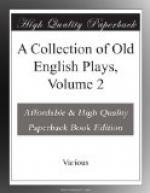Pedro. No [know], there’s a thing about me Shall strike thee into dust & make thy tongue With trembling to proclayme thyselfe a Villaine More then thou yet hast done:—See, tis my Eye.
Hen. Oh, I am confounded! [Falls.
Man. But I comforted
With the most heavenly apparition
Of my deare honourd father.
Fer. Take thou comfort
By two more apparitions, of a father
And a lost daughter, yet heere found for thee.
Man. Oh, noble sir, I pray forgive my brother.
Ele. See, sir, I doe; & with my hand reach to him My heart to give him new life.
Fer. Rise, my Henrico!
Mac. Rise & receive a noble minded wife Worth troupes of other weomen.
Hen. Shame leaves me speechles.
Pedro. Gett thee a tongue againe, & pray, & mend.
Mac. Letters shall forthwith fly into Madrid To tell the King the storyes of Two Brothers, Worthy the Courtiers reading. Lovers, take hands: Hymen & gentle faeryes strew your way: Our Sessions turnes into a Bridall day.
All. Fare thee well, Englishman.
Pike. I will ring peales of prayers of you all, My Lords & noble Dons.
Mac. Doe soe, if thou hast iust cause: howsoever, When thy swift ship cutts through the curled mayne, Dance to see England, yet speake well of Spayne.
Pike. I shall.—Where must I leave my pistoletts?
Gent. Follow mee.
[Exeunt Omnes.
FINIS.
INTRODUCTION TO THE LADY MOTHER.
The authorship of this anonymous play, now printed for the first time (from Eg. MS. 1994), is not difficult to discover. Any one who has had the patience to read the Plays of Henry Glapthorne cannot fail to be amused by the bland persistence with which certain passages are reproduced in one play after another. Glapthorne’s stock of fancies was not very extensive, but he puts himself to considerable pains to make the most of them. In The Lady Mother we find the same ornaments spread out before us, many of them very tawdry at their best. Glapthorne’s editor has striven to show that the weak-kneed playwright was a fellow-pupil of John Milton’s at St. Paul’s. One cannot think of the two names together without calling to mind the “lean and flashy songs” and “scrannel pipes of wretched straw” in Lycidas.
Yet Glapthorne was a man of some parts. He had little enough dramatic power, but he writes occasionally with tenderness and feeling. In his poetical garden rank weeds choke up the flower-beds; but still, if we have patience to pursue the quest, we may pick here and there a musk-rose or a violet that retains its fragrance. He seems to have taken Shirley as his master; but desire in the pupil’s case outran performance. It is, indeed, a pitiful fall from the Grateful Servant, a honey-sweet old play, fresh as an idyl of Theocritus, to the paltry faded graces of the Lady’s Privilege.




